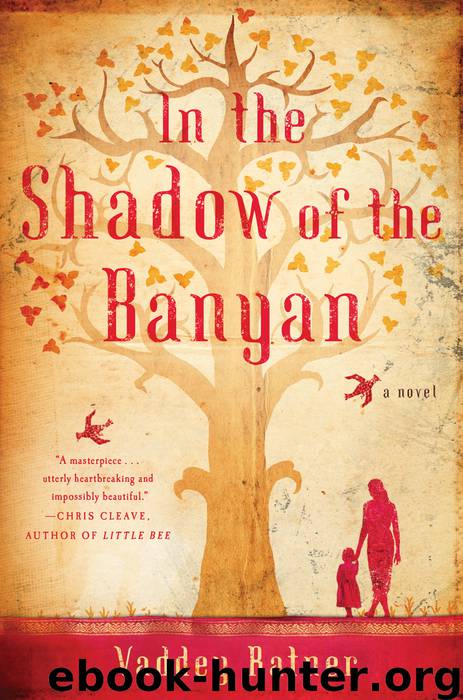In the Shadow of the Banyan by Vaddey Ratner

Author:Vaddey Ratner [Ratner, Vaddey]
Language: eng
Format: epub
Publisher: Simon & Schuster
Published: 2012-08-28T17:39:15+00:00
seventeen
So began my education, with Pok as my guide and guardian, this gentle soul who called himself neak prey—a “man of the forest”—because he’d never seen a refrigerator or known the taste of ice, but who, with quiet patience and thor, would help us to withstand the rigors of our reincarnation from city people to peasants. To begin with, that morning, after we’d finished our second helpings of palm juice, Pok directed my gaze to the rooster weathervane turning at the top of the hut. Here, he explained, our lives were ruled by the seasonal change of the monsoon’s breath, which when blowing from the southwest brought rains and rice, and from the northeast dryness and scarcity. He described in detail the layout of Stung Khae and its neighboring villages, dotting them on his palm with the tip of his finger in an S-shaped curve from north to south. Together there were twelve villages in the commune. Stung Khae, the fourth village from the north, was cradled right at the crook of a small river, the one Pok had just pointed out to me. The river, also called Stung Khae, threaded its way between ours and the third village, connecting up with Prek Chong, a large tributary of the Mekong, somewhere in the distant north.
At the mention of the Mekong, my heart went aflutter, my mind became distracted, and I asked Pok if he could take me there, to which he replied, “Oh, child, it’s many forests and rivers away!” He admitted he’d never seen it.
“Papa said—” I stopped.
“Yes? Your papa said . . .”
I couldn’t tell him. Couldn’t bear to say more. Not yet. Pok understood. The newness of my loss was apparent to him.
“Come,” he said and led me across the vast green expanse, to where a group of farmers were busy preparing the paddies for planting. The men, each in a field with his plow and water buffalo, churned the flooded ground, turning the turbid water and earth into thick, doughy mud. Nearby, on a patch of land where two dikes met, the women hoed dirt from a termite mound into rattan baskets for children to scatter in the paddies. The dirt full of termites—dey dombok, Pok called it, teaching me the proper names of things as he went—would get ground up by the plows and become potent fertilizer for the soil. Then, after another rain or two, when the upturned soil had settled and evened out but was still soft enough to push one’s thumb through, tender rice seedlings would be brought from the village’s thnaal sanab and transplanted into the paddies. The rains would continue, nourishing the rice as well as providing sanctuaries for minnows, tadpoles, snails, crabs, and countless other tiny creatures we could collect for food, for our own nourishment.
“What about leeches?” I wanted to know.
“Oh, they’re everywhere!” He lowered himself on one knee, dipped his arm into a rain-flooded paddy, and pulled out a cylindrical bamboo trap—troo, he called it, which was different from angrut, the cone-shaped trap used for ensnaring larger catches, like catfish or eels.
Download
This site does not store any files on its server. We only index and link to content provided by other sites. Please contact the content providers to delete copyright contents if any and email us, we'll remove relevant links or contents immediately.
In Control (The City Series) by Crystal Serowka(36228)
The Wolf Sea (The Oathsworn Series, Book 2) by Low Robert(35249)
We Ride Upon Sticks by Quan Barry(34538)
Crowbone (The Oathsworn Series, Book 5) by Low Robert(33623)
The Book of Dreams (Saxon Series) by Severin Tim(33386)
The Daughters of Foxcote Manor by Eve Chase(23628)
Trainspotting by Irvine Welsh(21666)
Call Me by Your Name by André Aciman(20516)
The Secret History by Donna Tartt(19088)
Shot Through The Heart (Supernature Book 1) by Edwin James(18926)
All the Missing Girls by Megan Miranda(16028)
American King (New Camelot #3) by Sierra Simone(15891)
The Girl from the Opera House by Nancy Carson(15785)
Pimp by Iceberg Slim(14507)
Sad Girls by Lang Leav(14423)
The Betrayed by Graham Heather(12832)
The Betrayed by David Hosp(12792)
4 3 2 1: A Novel by Paul Auster(12392)
Still Me by Jojo Moyes(11266)
